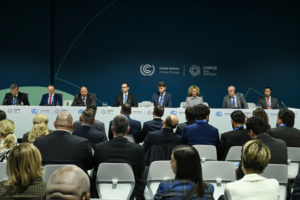By Mackie M. Jalloh
At COP29 in Baku, during the Russian side event titled “Russia’s Contribution to Strengthening Global Food Security,” Sergey Tverdokhleb, Deputy Chairman of the Committee on Climate Policy and Carbon Regulation of the Russian Union of Industrialists and Entrepreneurs, delivered an insightful presentation on the intricate relationship between the climate crisis and global food security. The event brought together Russian officials, industrial leaders, and international participants to discuss some of the most pressing global challenges.
Tverdokhleb underscored how climate change and food security are profoundly interlinked. On one hand, the escalating climate crisis—manifested through extreme weather events such as floods, droughts, and heatwaves—poses a direct threat to agricultural productivity. On the other, the unintended economic and social consequences of climate policies, particularly those involving stringent regulations, are reverberating through global food systems.
“The impact of floods, droughts, and other climate-related disasters, directly reduces crop yields in many countries,” Tverdokhleb explained. He highlighted the urgency of the situation by citing recent crises, such as southern African nations declaring states of emergency due to devastating losses of grain and livestock. These events left over 10 million people in acute hunger, painting a stark picture of how climate variability disrupts food supply chains and increases vulnerability among populations.
Rising global temperatures and shifting precipitation patterns are not only affecting yields, but also changing the geographical viability of crops. Staple crops such as wheat, rice, and maize are increasingly under threat, while pests and diseases are proliferating, due to warmer climates. These dynamics disproportionately affect regions already struggling with food insecurity, particularly in the Global South.
While efforts to curb climate change through policies such as carbon taxes and emissions reductions are essential, Tverdokhleb pointed out that such measures can have unintended consequences. “A classic example is the European cross-border carbon tax, which will increase fertilizer prices and reduce revenues for the budgets of developing countries,” he said. This, in turn, undermines the ability of these nations to subsidize farmers and consumers, exacerbating food insecurity.
This concern aligns with earlier warnings from Andrey Melnichenko, Chair of the RSPP Committee on Climate Policy and Carbon Regulation. In a 2022 interview with Bloomberg, Melnichenko noted that sanctions on fertilizer exports could severely impact global food production. He estimated that fertilizer shipments lost to sanctions over 12 months could have grown enough grain to feed over 200 million people. Such economic barriers highlight the complex interplay between climate action and food security, particularly for vulnerable regions.
Speakers at the event emphasized Russia’s critical role in addressing global food security, particularly through its substantial contributions to food and fertilizer exports. Over the past year, Russian fertilizer exports increased by 25%, benefiting approximately 1.2 billion people, primarily in the Global South. “Russian fertilizers provide 22% of the nutrients used by farmers in these regions, underscoring their critical role,” Tverdokhleb noted.
This contribution is particularly vital as developing nations face significant challenges in maintaining agricultural productivity amidst rising costs and changing climate conditions. By supporting fertilizer access, Russia plays a pivotal role in stabilizing food production in regions most affected by hunger and poverty.
Despite the challenges, Tverdokhleb expressed optimism about the potential for agricultural climate projects to address both emissions reduction and food security challenges. “Nature-based projects in agriculture could reduce or offset at least 35–40% of global agricultural emissions,” he explained. Initiatives such as sustainable farming practices, reforestation, and soil carbon sequestration offer dual benefits, contributing to both climate mitigation and enhanced agricultural productivity.


These solutions, he argued, must form the cornerstone of international climate efforts. By integrating food security considerations into climate policies, the global community can work toward a balanced approach that addresses the root causes of both crises without compromising economic stability.
The discussions at COP29 highlighted the urgency of fostering international collaboration to address the intertwined challenges of climate change and food security. Participants stressed the need for inclusive and equitable climate policies that consider the economic realities of developing nations, while promoting sustainable agricultural practices.
As the world grapples with the dual crises of climate change and food insecurity, events like this underscore the importance of proactive measures, transparent dialogue, and partnerships to ensure a resilient and equitable future for all.